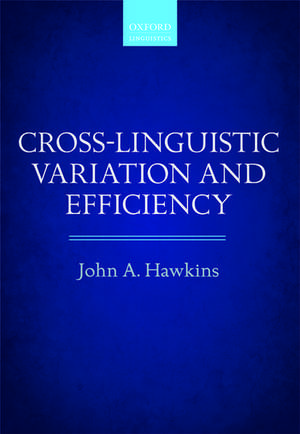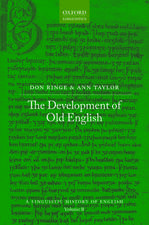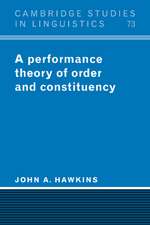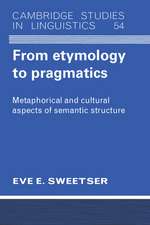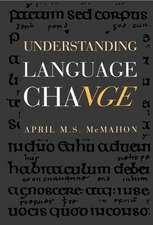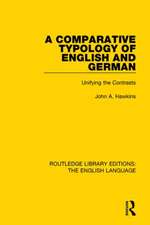Cross-Linguistic Variation and Efficiency
Autor John A. Hawkinsen Limba Engleză Paperback – 27 feb 2014
| Toate formatele și edițiile | Preț | Express |
|---|---|---|
| Paperback (1) | 349.32 lei 32-37 zile | |
| Oxford University Press – 27 feb 2014 | 349.32 lei 32-37 zile | |
| Hardback (1) | 791.46 lei 32-37 zile | |
| Oxford University Press – 27 feb 2014 | 791.46 lei 32-37 zile |
Preț: 349.32 lei
Nou
Puncte Express: 524
Preț estimativ în valută:
66.85€ • 70.29$ • 55.23£
66.85€ • 70.29$ • 55.23£
Carte tipărită la comandă
Livrare economică 07-12 aprilie
Preluare comenzi: 021 569.72.76
Specificații
ISBN-13: 9780199665006
ISBN-10: 0199665001
Pagini: 292
Ilustrații: black & white tables, figures
Dimensiuni: 172 x 247 x 18 mm
Greutate: 0.53 kg
Editura: Oxford University Press
Colecția OUP Oxford
Locul publicării:Oxford, United Kingdom
ISBN-10: 0199665001
Pagini: 292
Ilustrații: black & white tables, figures
Dimensiuni: 172 x 247 x 18 mm
Greutate: 0.53 kg
Editura: Oxford University Press
Colecția OUP Oxford
Locul publicării:Oxford, United Kingdom
Recenzii
Reviews of Efficiency and Complexity in Grammars Jack Hawkins has long been a trail-blazer in the attempt to reconcile the results of formal and functional linguistics. Efficiency and Complexity in Grammars charts new territory in this domain. The book argues persuasively that a small number of performance-based principles combine to account for many grammatical constraints proposed by formal linguists and also explain the origins of numerous typological generalizations discovered by functionalists.
Efficiency and Complexity in Grammars is a landmark work, setting a new standard in the study of the relationship between linguistic competence and performance.
Hawkins argues that grammars are profoundly affected by the way humans process language. He develops a simple but elegant theory of performance and grammar by drawing on concepts and data from generative grammar, linguistic typology, experimental psycholinguistics and historical linguistics. In so doing, he also makes a laudable attempt to bridge the schism between the two research traditions in linguistics, the formal and the functional. Efficiency and Complexity in Grammars is a major contribution with far-reaching consequences and implications for many of the fundamental issues in linguistic theory. This is a tremendous piece of scholarship that no linguist can afford to neglect.
Efficiency and Complexity in Grammars is a landmark work, setting a new standard in the study of the relationship between linguistic competence and performance.
Hawkins argues that grammars are profoundly affected by the way humans process language. He develops a simple but elegant theory of performance and grammar by drawing on concepts and data from generative grammar, linguistic typology, experimental psycholinguistics and historical linguistics. In so doing, he also makes a laudable attempt to bridge the schism between the two research traditions in linguistics, the formal and the functional. Efficiency and Complexity in Grammars is a major contribution with far-reaching consequences and implications for many of the fundamental issues in linguistic theory. This is a tremendous piece of scholarship that no linguist can afford to neglect.
Notă biografică
John A. Hawkins is a professor of Linguistics at the University of California, Davis, and the Emeritus Professor of English and Applied Linguistics at the University of Cambridge. He has also held previous positions at the University of Southern California and the Max Planck Institute for Psycholinguistics, and visiting appointments at institutions including UCLA, UC Berkeley, the Free University of Berlin and the Max Planck Institute for Evolutionary Anthropology. He has published many books and articles on typology and universals, syntax and grammatical theory, psycholinguistics, and historical linguistics, including A Performance Theory of Order and Constituency(CUP 1994), Efficiency and Complexity in Grammars (OUP 2004) and, co-authored with Luna Filipovic, Criterial Features in L2 English: Specifying the Reference Levels of the Common European Framework (CUP 2012).
